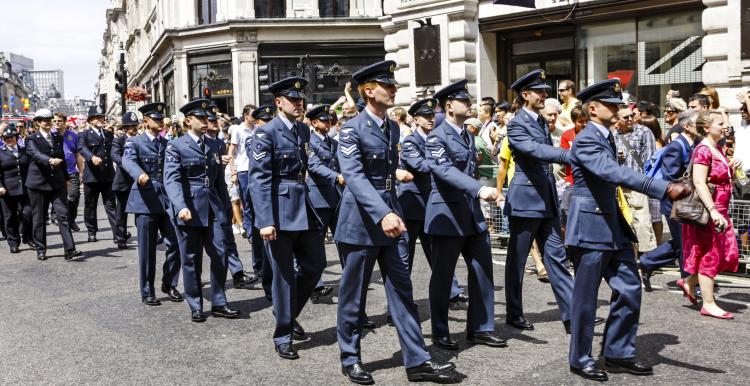Hertfordshire’s Armed Forces community wants help to navigate the NHS

Building on our previous research into improving healthcare for veterans, our latest Service and Care: The Healthcare Journey of the Armed Forces Community Report took a broader approach to hear from the armed forces community as a whole, to find out if anything has improved in recent years and what still needs to be done.
Although many experienced similar issues as the general population, some in the armed forces community said they faced challenges in receiving the priority treatment they were entitled to, for conditions resulting from their military service. They also struggled to understand and access the NHS because healthcare provision within the military operated very differently.
Mental health was a particular difficulty faced by many of those we spoke to. Some struggled to access support, while others were reluctant to use mental health services due to stigma.
What did we do?
We were commissioned by the local NHS to explore the views and experiences of the armed forces community.
We conducted a focus group and 15 in-depth interviews between November 2024 and January 2025. We heard from 19 people, including nine veterans, seven reservists (active and non-mobilised), one person currently serving and two family members.
A website audit was also undertaken to explore how well healthcare providers signpost and support the armed forces community. Although more than half of all GP practices across Hertfordshire and West Essex were officially accredited as Veteran Friendly, our audit of 96 GP practices, found that 40% of them had no information on their website about registering as a member of the armed forces community and 45% had no signposting to any supporting resources.
If veterans are identified by the NHS and care services, they can access specialised services available only to them and any 'priority treatment' that they might be entitled to under the Armed Forces Covenant.
What did people tell us?
The key themes that came out of our research included:
NHS services: Need to provide more signposting and support to the armed forces community. This includes:
- more training, knowledge and understanding for healthcare professionals about the specific needs of this community;
- greater awareness of the Veteran Friendly or Veteran Aware accreditation schemes;
- NHS services should ensure military families are aware of the help available to them.
“I know everyone’s in the same boat, we’re all waiting for the NHS, but we’ve served our country, we gave up our life for years and it kind of feels we’re at the bottom of the list.”
“There’s nothing really to tick that I remember … when I first signed up to say I’m a veteran so that needs to be more clear because I didn’t know.”
Mental health: Services lacked understanding of the specific experiences of the armed forces community and the negative impact that serving had on their mental health. Some respondents also said stigma around accessing mental health support was a barrier that made some reluctant to accept help.
“I do know there is quite a lot of people out there who have taken their own lives through not having this support for their mental health.”
“When I got sent for CBT with the specialist we were talking about the same thing every time, it wasn’t geared towards a veteran thing. It didn’t really look deeply into my case, they used a one size fits all approach rather than a specific approach that looks at the person and their background.”
GP practices: Need to be proactive in identifying members of the armed forces. Many respondents had not informed their GP practice of their military background and/or did not know if this information was on their patient records.
“When I moved to this particular GP practice, I tried telling them and I tried at the desk and the interest rate was, let’s say zero or negative.”
“I think there needs to be more training for GP surgeries and hospitals on the type of care the military personnel need. It’s something I feel really strongly about.”
The NHS and the military need to work more effectively together: Veterans and reservists shared the challenges they faced in obtaining their medical records from the military, or having them transferred to the NHS. The need for better collaboration was emphasised.
“I never had my medical notes. In hindsight the solider needs to come out with 20 years, or at least 5 years of medical so that I can give it to a doctor, here’s my medical notes, do what you wish with them, but at least you know my background.”
“Access to a dedicated armed forces liaison within GP practices could have facilitated a smoother transition…appoint dedicated staff within NHS facilities to act as liaisons for veterans, ensuring their unique needs are understood and addressed.”
GP practice and NHS Trust websites: Need to have more information available about registering as a member of the armed forces community and/or signposting to specialised services and support. NHS Trusts had very limited information, with the exception of Princess Alexandra Hospital NHS Trust which is an example of good practice.
“I remember receiving a discharge booklet and that would be the opportunity to include the available help to you as an individual when you leave. The helplines, the websites, whatever it is, that’s the place of it to be.”
“So you’ve gone from a regimented thing to nothing, there’s no guidance on how you’re supposed to navigate the civilian life.”
What happens next?
Based on our findings, we have made a range of recommendations to help improve the experiences of the armed forces community. These include:
- Ensure patients are invited to register as a member of the armed forces community and patient records are accurately maintained. Improve training, awareness and knowledge amongst professionals to enable better understanding of their specific needs.
- Increase awareness of mental health support and encourage the armed forces community to access help available to them. Priority treatment for this care should be granted if eligible.
- Consider working with the military to support service leavers with integration and navigating the NHS system. This includes effective collaboration between the military and the NHS to ensure better data sharing and maintenances of patient records.
- Signpost the armed forces community to military charities, organisations, local support groups and NHS specific services. This should include ensuring information is readily available within healthcare settings and webpages.
- Consider implementing “veteran champions” within healthcare services and promoting Veteran Friendly and Veteran Aware accreditations (if awarded) to build trust with the armed forces community.
- Review access to priority treatment to ensure those eligible are receiving care. Awareness and understanding of eligibility should also be improved amongst professionals and patients.
- Audit and measure the effectiveness of Veteran Friendly and Veteran Aware accreditations to ensure the required standards are being met.
“We appreciate all of the armed forces community that took the time to share their experiences of accessing healthcare services locally. The ICB, along with our partners, are committed to ensuring members of the Armed Forces Community have fair and easy access to health and social care services. We are now working with Change Grow Live to improve services specifically for Hertfordshire AFC with these recommendations in mind including working with GP practices and local Trusts to ensure they have good information available for the community to access and encourage patients to register as members of the armed forces community.”
Harper Brown - Director for Integrated Specialised Care, Hertfordshire and West Essex Integrated Care Board
Local support available to veterans
If you're a member of the armed services community, there is support available for you. This support ranges from healthcare, housing, employment, welfare and more. We have listed some links below:
- The Veterans' Gateway service provides a single point of contact for veterans, their families or the bereaved who are seeking advice or support.
- Op COURAGE is a NHS mental health specialist service to help veterans and their families. This service combines the Veterans' Mental Health Transition, Intervention and Liaison Service (TILS), the Veterans' Mental Health Complex Treatment Service (CTS) and the Veterans' Mental Health High Intensity Service (HIS).
- Veterans Breakfast Clubs in Hertfordshire are for veterans to meet up in a relaxed, safe and social environment.
- The Hertfordshire Heroes website has information on where you can find support for employment, housing and schools, as well as support for carers.
- The NHS website has details on healthcare and welfare support dedicated to veterans and their families and carers.
- Royal British Legion website provides expert advice and guidance for members of the Armed Forces, veterans and their families. Branches of the Royal British Legion in Hertfordshire can be found here.
Downloads
Read the full Service and Care: The Healthcare Journey of the Armed Forces Community Report here.


